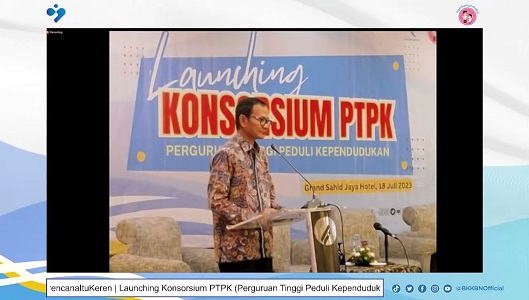BKKBN Inaugurates PTPK Consortium, IPB University Is Involved in Overcoming Population Issues

IPB University is involved with 12 other universities in the Consortium of Population Care Universities (PTPK), which was inaugurated on Tuesday (18/7) at Grand Sahid Jaya. The consortium was formed to realize population-minded development. The reason is that the role of universities is very important in efforts to overcome population issues.
The PTPK consortium is a form of cooperation between the National Family Planning Coordinating Board (BKKBN) and universities to overcome various population issues in Indonesia. Population issues need to be addressed so that the 2030 sustainable development target and the 2045 Golden Indonesia can be achieved.
Prof Nizam, Director General of Higher Education, Research and Technology, Ministry of Education, Culture, Research and Technology, said that the vital role of universities can be utilized to integrate various population programs.
"The university is a node that unites various existing programs so that they synergize and have an impact on the wider community, especially through population strengthening. The presence of the campus has a very important role as a spring for the progress of the nation and state, cooling the community, and bringing goodness and good news to the wider community," he explained.
The function of the tri dharma of the university, he continued, can be realized in the form of a real contribution in the form of cooperation with the government in overcoming population problems in Indonesia. One of them is through the Independence Campus program and the development of the Kedai Reka and Matching Fund programs.
The Chairman of BKKBN, Dr Hasto Wardoyo, said in his speech that the launch of the PTPK Consortium was in line with the objectives of implementing the Golden Indonesia 2045 human resource development program. He said,
"Currently, BKKBN is running a program with a focus on reducing stunting rates and preparing to face the demographic bonus in Indonesia. In its implementation, the role of universities is needed to help succeed in implementing the program. The contribution made can be through the implementation of real work lectures (KKN) and internships with a focus on stunting thematic and demographic bonuses," said Dr Hasto.
The same thing was conveyed by Dr Suprayoga Hadi, Secretariat of the Vice President of the Republic of Indonesia. According to him, universities can support the government in achieving an accelerated reduction in stunting rates and poverty elimination.
"Through focusing on the tridharma, namely research, universities can find the root causes of stunting and extreme poverty and develop effective strategies for overcoming these problems," he said.
BKKBN Deputy for Population Control, Dr Bonivasius Prasetya Ichtiarto, emphasized the role of universities through the PTPK Consortium to make a real contribution through various study programs and innovations in reducing stunting and eliminating poverty.
"In addition, in reducing stunting rates and eliminating extreme poverty, we are inseparable from MBKM because it is a very visible part, for example with the Thematic Real Work Lecturer and field humanitarian programs. That's very real when it comes to the two main programs," said Dr Bonivasius.
In addition to IPB University, the 12 universities involved are Sebelas Maret University, Hasanuddin University, North Sumatra University, University of Indonesia, Bandung Institute of Technology, Gadjah Mada University, Yogyakarta State University, Airlangga University, Padjadjaran University, Mulawarman University, Udayana University, Padang State University, and Tadulako University. (MW/Rz) (IAAS/MZS)



